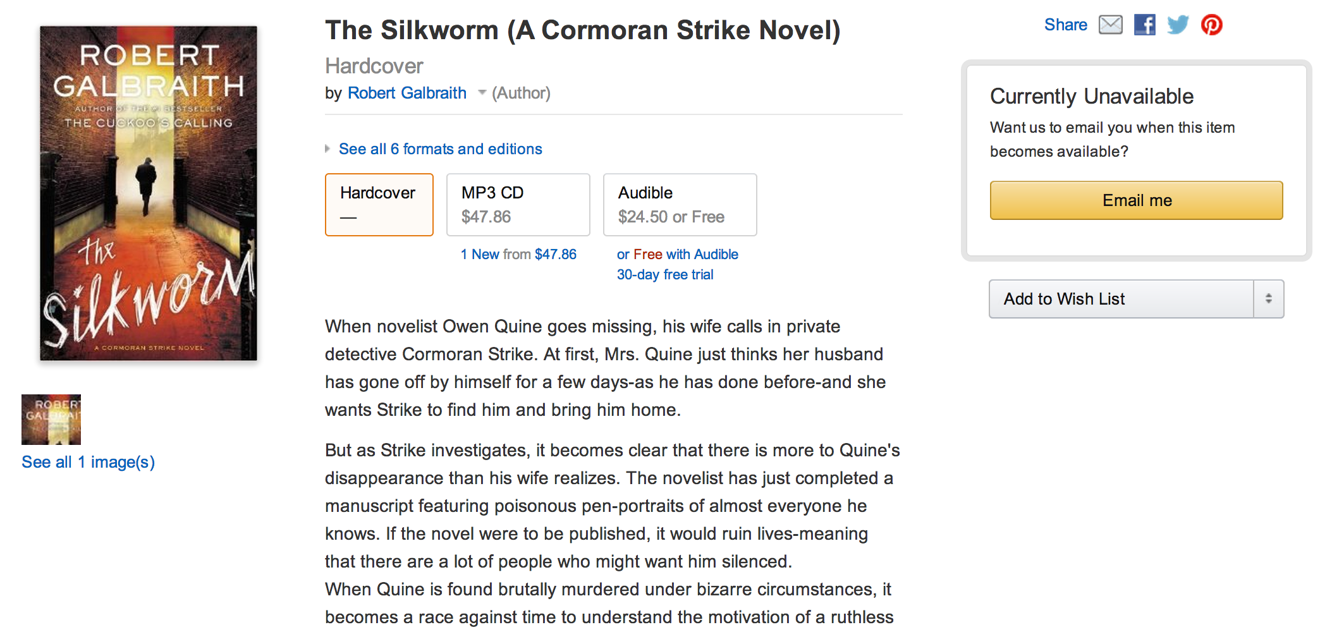Amazon is currently in the midst of a fight with Hachette, one of the so-called "Big Five" largest publishing companies, and has stopped taking preorders for high-profile upcoming titles, including the latest from "Harry Potter" series author J.K. Rowling.
The market dominating book seller on Thursday began refusing preorders for several upcoming Hachette titles including Rowling's latest, "The Silkworm," written under the pseudonym Robert Galbraith. The latest moves by Amazon, detailed by The New York Times, come as the retailer is involved in ongoing negotiations with Hachette, which is the smallest of the top five publishers.
Hachette has also seen higher prices on physical books, slower shipping times, much cheaper prices via the Kindle platform, and recommendations for alternative titles in their Amazon listings. The moves are widely believed to be designed to discourage sales of physical books sold by Hachette.
In addition, Amazon is also at odds with Bonnier, a major international publisher, by delaying deliveries of its titles in Germany.
Industry watchers believe Amazon is using its power to frustrate writers, hoping they will help pressure publishers like Hachette and Bonnier to give a more favorable — Â and profitable — Â contract to the online mega-retailer. Amazon is facing its own pressure from investors, who want to see the company's razor-thin margins improve.
All of this comes after the U.S. government sided with Amazon and punished Apple for its own moves in the e-book market with the launch of iBooks. Last year, the government successfully sued Apple in an antitrust trial, as a judge ruled that the iPad maker was guilty of conspiring with book publishers to raise e-book prices, and as a result hurt consumers.
Apple led the charge in convincing publishers to switch to a so-called "agency" pricing model. That prevented content owners from being able to sell the same titles at a lower price elsewhere, without offering the same price on Apple's iBooks platform — a "most favored nations" clause.
In contrast, the e-book industry prior to the launch of the first iPad was under the "wholesale model" preferred by market leader Amazon. In that model, resellers such as Amazon had the power to set prices, selling titles at or below cost if they chose to do so.
As part of the ruling against Apple, the company was saddled with an injunction barring the company from entering into any unsavory deals with publishers. Antitrust watchdog Michael Bromwich was also assigned to keep an eye on Apple. Bromwich and Apple have butted heads since he was installed last October.
Apple has formally appealed the antitrust ruling, asking for either a dismissal of the verdict or a complete retrial. Apple continues to believe that the iBookstore and iPad created competition in the e-book space, where Amazon's Kindle platform controlled some 90 percent of the market as of 2009.
 AppleInsider Staff
AppleInsider Staff







-m.jpg)






 Christine McKee
Christine McKee
 Chip Loder
Chip Loder
 Malcolm Owen
Malcolm Owen
 Marko Zivkovic
Marko Zivkovic
 Wesley Hilliard
Wesley Hilliard







-m.jpg)




82 Comments
Interesting how government is not going against the real monopoly in the book/ebook market: the Amazon store. Are Amazon lobbyists paying better than Apple's? Apple is still a giant neophyte in the lobby area. Google and Amazon have strong lobbies in Washington, Apple has a small one. And it shows. Google is a monopoly in search and government is not going after them. Amazon is a monopoly in online sales and books, and government is not going after them either. Time for T.Diddy to wake up and hire some real lobbyists and start defending Apple from government goons.
The Times needs to leave St. Bezos alone.
A publisher could always drop Amazon and give Apple the exclusive...just thinking out loud here.
DoJ then sues Apple, forcing them to nullify the deal.
Heh heh. Predictable (although, I would not have expected it so soon).
These fools -- including a whole bunch of authors as well as Amazon users, Cote, Bromwich, and the US DoJ -- are simply reaping what they sowed.